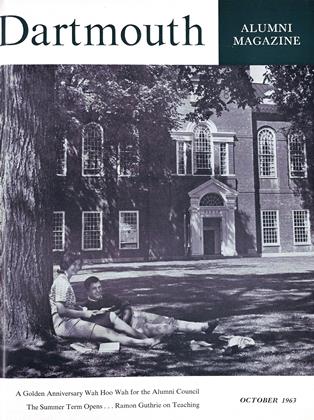By Robert Heussler '46. Syracuse.Syracuse University Press, 1963. 260 pp.$5.75.
For today's world, here is a book of genuine significance. The United States, sending abroad yearly thousands of official representatives, is rightly concerned about the image of this country which they create. Whether in the State Department, the armed forces, the Peace Corps, or what not, the ugly American" is always a disagreeable possibility, one who can do great damage to the interests of our country. Yet those who have had to do with the selection of young men for positions of responsibility know how difficult it is to make valid judgments on how they will turn out, and any guideposts should be looked at carefully - Mr. Heussler's book particularly.
In 1920, when Great Britain still had a large colonial empire, those in charge of it in London became concerned about the quality of the men actually running it in the field. Considering the age of the empire, this was a rather late concern, and it is startling to read about the offhand manner of filling colonial posts that was followed up to that time. Mr. Heussler's task is to pick up the story there, and tell how the colonial service was selected and trained in the quarter century to 1945. This was the colonial service, we should remember, which has the best record for all countries, including probably our own, of bringing along the less developed areas and fitting them for that independent national existence that nearly all have achieved. As you read the book, it becomes clear why Nigeria, which became a British colony only in 1900, is the African state best fitted for independence of all those in West Africa.
There is no intention of saying that the needs of a colonial empire are our needs, when we want to help only, or that the British social structure is ours too, or the methods of selection used there the ones we should use. The qualities that were needed we do want — strength of readiness to accept responsibility, care for the people involved, courage and adaptability. The success of British policy toward the backward areas was due to the Colonial Service - men selected by moral standards - and the part of what they did that made the deepest impression was the personal one. As a study of the selection of the British Colonial Service, Mr. Heussler's book is highly praised by Sir John MacPherson, head of the Colonial Office, and by Miss Margery Perham of Oxford, who helped for many years to train those newly chosen. To this should be added a note on the easy style, the careful research, the wide knowledge of the Colonial Service itself, the perceptive and often entertaining comments on English ways and institutions, and the useful reminder that man maketh all things.
 View Full Issue
View Full Issue
More From This Issue
-
 Feature
FeatureTHE FIRST FIFTY YEARS
October 1963 By SIDNEY C. HAYWARD '26, -
 Feature
FeatureSome Thoughts About Teaching
October 1963 By RAMON GUTHRIE, A.M. '38 -
 Feature
FeatureArtistry on Film ... ... With Serious Intent
October 1963 -
 Feature
FeatureSUMMER '63
October 1963 -
 Article
ArticleDeaths
October 1963 -
 Article
ArticleWITH THE BIG GREEN TEAMS
October 1963
HERBERT W. HILL
-
 Books
BooksA SYNOPTIC HISTORY OF THE GRANITE STATE,
February 1940 By Herbert W. Hill -
 Article
ArticleDARTMOUTH'S SKIPPER
June 1944 By HERBERT W. HILL -
 Books
BooksYANKEE KINGDOM.
July 1960 By HERBERT W. HILL -
 Books
BooksIDEAS, WEALS, AND AMERICAN DIPLOMACY: A HISTORY OF THEIR GROWTH AND INTERACTION.
OCTOBER 1966 By HERBERT W. HILL -
 Books
BooksAS A CITY UPON A HILL.
FEBRUARY 1967 By HERBERT W. HILL -
 Article
ArticleThose Early Days of Alumni College
MARCH 1971 By HERBERT W. HILL
Books
-
 Books
BooksVolume three of the Dictionary of American Biography, published
January, 1930 -
 Books
BooksMATHEMATICS IN MEDICINE AND THE LIFE SCIENCES.
OCTOBER 1966 By JOHN PHILIP HENRY, M.D. -
 Books
BooksPoetic Institution
October 1980 By R. H. R. -
 Books
BooksMODERNIZATION, DISLOCATION, AND APRISMO: ORIGINS OF THE PERUVIAN APRISTA PARTY, 1870-1932.
October 1974 By SCOTT PALMER '59 -
 Books
BooksTHE TEACHING OF ENGLISH: AVOWALS AND VENTURES
JUNE, 1928 By Stearns Morse -
 Books
BooksPROCEEDINGS OF THE SECOND N. H. BANK MANAGEMENT CONFERENCE
October 1941 By William A. Carter '20.


